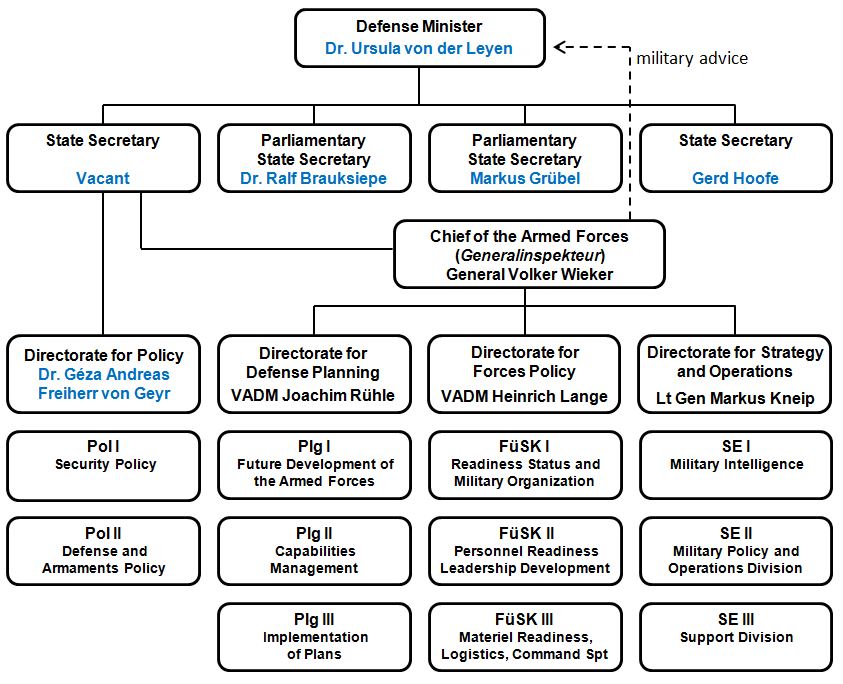Ministry of Defense
Stephan Wallace
Defense and Security Policy Analyst
Stephan Wallace is a defense and security policy analyst following political, military, and economic developments in Europe. He has worked more than 33 years on this area for the U.S. government, most recently for the U.S. Department of Defense.
Dr. Ursula von der Leyen took over leadership of the Ministry of Defense on 17 December 2013. She replaced Thomas de Maizière, who returns to the post of Interior Minister, a position he held during the first years of Merkel’s second cabinet before becoming Defense Minister in March 2011 following the resignation of Karl-Theodore zu Guttenberg. Von der Leyen served previously as Minister for Family, Seniors, Women, and Youth in Merkel’s first cabinet (2005-09) and as Minister for Labor and Social Affairs in the second Merkel government (2009-13). In December 2010, she was elected a deputy chairwoman of the CDU at the party’s 23rd Congress in Karlsruhe. Although von der Leyen entered politics at the comparatively late age of 43—after beginning a career in medicine and raising a family of seven children—she quickly became one of the CDU’s most accomplished and successful stars and developed an ambition for higher office. Von der Leyen was considered a front-runner in the German presidential race of 2010 before losing out to Christian Wulff and is now regarded as a likely successor to Chancellor Merkel if she can successfully manage her term as Defense Minister. This will be no easy task, as the position has destroyed the political careers of many rising stars in the past. [1]
Von der Leyen is committed to the ideal of deeper European integration and stated during an August 2011 interview for the German weekly Der Spiegel that her goal is a “United States of Europe patterned after federal states such as Switzerland, Germany, or the USA.”[2] She was born in Brussels in 1958 and spent the first 13 years of her life there as the daughter of Ernst Albrecht, a senior German “Eurocrat” at the Commission of the then European Economic Community who went on to have a successful political career as Minister-President of Lower Saxony from 1976 to 1990. Von der Leyen attended the European School in Brussels where she became fluent in French and English and practiced in dealing with other Europeans.[3]
In her early speeches as Defense Minister—at de Maizière’s farewell ceremony 9 January and before the Bundestag on 16 January—von der Leyen said she will build on the work begun by de Maizière with regard to defense reforms and restructuring the Bundeswehr, as well as expanding the pooling and sharing of military capabilities with close allies and partners in the EU and NATO. She insisted that “there will be no reform of the reform” but announced plans to improve morale in the armed forces, in particular by introducing more “family-friendly” practices, such as more flexible working hours when possible and longer intervals between foreign deployments.[4]
Select defense and security policy leadership positions in the Ministry of Defense (changes shown in blue text).
Although von der Leyen brought her own leadership team into the ministry, she initially retained State Secretary Stéphane Beemelmans on the recommendation of former Defense Minister de Maizière because of his key role in the defense reform effort. Beemelmans continued his responsibility for the Staff Organization and Revision (Bundeswehr structural reform) and the Directorate for Armaments, but also took over new responsibilities for the Directorate for Policy and the Directorates under the Chief of the Armed Forces (Defense Planning, Forces Policy, and Strategy and Operations).[5] Beemelmans’ position became untenable when a new armaments board created to provide more insight into problems with major weapons programs failed to deliver credible assessments in its first report. Von der Leyen refused to sign off on the report, claiming it overstated the programs’ potential while playing down the risks of more cost overruns, time delays, and underperformance. In an effort to instill accountability, she dismissed Beemelmans and reassigned Detlef Selhausen, the directorate chief for armaments, information technology, and operations (AIN), to other duties.[6]
- Armed Forces Chief General Volker Wieker assumed Beemelmans’ responsibilities for armaments, and Selhausen’s AIN directorate has been temporarily assigned to Vice Admiral Joachim Rühle, who heads the Directorate for Defense Planning. State Secretary Gerd Hoofe took on responsibility for the Staff Organization and Revision, as well as Beemelmans’ other duties.[7]
BND Vice President Dr. Géza Andreas Freiherr von Geyr took over the Directorate for Policy from Dr. Ulrich Schlie on 17 March.[8] The directorate shapes and coordinates defense and security policy, including military and armaments policy. The directorate chief also serves as the Political Director for the Defense Ministry, representing the ministry in inter-ministry discussions and in contacts with foreign counterparts.[9] Von Geyr served as a member of the German foreign service from 1991 to 2001, when he took a position with the CDU/CSU parliamentary group’s foreign policy working group and the office of its then Deputy Chairman for Foreign, Security, and European Policy, Dr. Wolfgang Schäuble. In 2006 von Geyr joined the Federal Chancellery’s Directorate for Foreign and Security Policy, and in 2010 he was named Vice President of the BND.[10]
Parliamentary State Secretary Dr. Ralph Brauksiepe (CDU) focuses on the areas covered by the directorates for policy, defense planning, forces policy, and strategy and operations, as well as those covered by the budget directorate. One of his most important tasks is representing the ministry before the Bundestag appropriations committee.[11] Brauksiepe has experience working on Bundestag committees, having been a member of the EU Affairs Committee from 1998-2002 and the senior CDU representative on the Committee for Economic Cooperation and Development from 2002 to 2005. From October 2009 to December 2013, he served as Parliamentary State Secretary in the Ministry for Labor and Social Affairs under von der Leyen.[12]
Parliamentary State Secretary Markus Grübel (CDU) focuses on the areas covered by the directorates for equipment, information technology, and in-service support; legal affairs; personnel; and infrastructure, environmental protection, and services. He deals with most procurement issues and represents the ministry before the Bundestag committees, especially the Defense Committee.[13] Chancellor Merkel reportedly chose Grübel for the post because of his successful political work for the CDU as a local and regional politician in Baden-Württemberg as well as for his familiarity with defense issues. Grübel is a lieutenant in the Naval Reserve and was a member of the Defense Committee in the previous Bundestag. In June 2013, Merkel chose him to be the CDU’s senior representative on the special investigative committee looking into the Euro Hawk procurement scandal.[14]
Von der Leyen’s long-time lieutenant Gerd Hoofe replaced Rüdiger Wolf in the other State Secretary position, which is responsible for the budget, legal, and personnel directorates, as well as the directorate for infrastructure, environmental protection, and services.[15] Hoofe has served under von der Leyen as a State Secretary since 2003, beginning in Lower Saxony’s Ministry for Social Affairs, Women, Family, and Health (2003-2005) and then moving with von der Leyen to the Federal Ministry for Family, Seniors, Women, and Youth (2005-2009) and the Federal Ministry for Labor and Social Affairs (2009-2013).[16]
Chief of the Armed Forces (Generalinspekteur) General Volker Wieker is the senior military officer in the armed forces and military adviser to the federal government since January 2010. He previously served as First Deputy Commander (2007-2008) and then Commanding General (2008-2010) of the 1st German-Netherlands Corps, after having served as Chief of Staff of the Army Staff (2004-2007).[17] Within the ministry, Wieker is responsible for the overall military defense concept, military operations, and military planning. The ministry’s directorates for defense planning, forces policy, and strategy and operations report through him to the ministry’s senior civilian leadership.[18]
- The Directorate for Planning under Vice Admiral Joachim Rühle is responsible for devising conceptual guidelines for the future development of the armed forces, translating concepts into specific plans, and managing military capabilities. [19]
- The Directorate for Forces Policy under Vice Admiral Heinrich Lange is responsible for maintaining the operational readiness of the armed forces.[20]
- The Directorate for Strategy and Operations under Lieutenant General Markus Kneip develops the strategic directives issued to the Bundeswehr’s Joint Forces Operations Command and provides strategic plans, operational doctrine, and military proposals for decisions on concepts for cross-government operations. It also provides input to support government decisions and parliamentary consent for the deployment of German military forces, and issues directives to the German Military Representative on the NATO and EU Military Committees.[21]
Stephan Wallace is a defense and security policy analyst following political, military, and economic developments in Europe. He has worked more than 33 years on this area for the U.S. government, most recently for the U.S. Department of Defense. He can be contacted by email at wallace.stephan@gmail.com. The views expressed are those of the author alone. They do not necessarily reflect the views of the American-German Institute (AGI).
[1] Christine Bach, “Ursula von der Leyen (geb. Albrecht),” biography posted on the internet site of the Konrad Adenauer Stiftung, January 2014; “Ursula von der Leyen – Ministerin mit Ambitionen“, Saarbrücher Zeitung, 12 Jan 2014; Judy Dempsey, “Merkel’s Favorite for German President Loses Out,” New York Times, 3 June 2010.
[2] “Von der Leyen fordert die Vereinigten Staaten von Europa,” Der Spiegel, 27 August 2011.
[3] Christine Bach, “Ursula von der Leyen (geb. Albrecht),” biography posted on the internet site of the Konrad Adenauer Stiftung, January 2014
[4] Ursula von der Leyen, Rede der Verteidigungsministerin von der Leyen zum Abschied von Thomas de Maizière (MP3), BMVg, 9 January 2014; Ursula von der Leyen, Speech before the Bundestag (video file), Deutscher Bundestag, 16 January 2014.
[5] Thomas Wiegold, “vdL-Personalie: Beemelmans zuständig für Politik und den GI,” Augen Geradeaus, 10 January 2014; “Die Verantwortungsbereiche der Staatssekretäre,” BMVg, 13 January 2010.
[6] “Ministerin zieht strukturelle und personelle Konsequenzen nach dem ersten Rüstungsboard,” BMVg, 20 February 2014; Lorenz Hemicker, “Von der Leyen traut ihrem eigenen Haus nicht,” Frankfurter Allgemeine Zeitung, 20 February 2014.
[7] “Rüstungsboard – Ein Instrument der Transparenz,” BMVg, 20 February 2014.
[8] Stephan-Andreas Casdorff, “Leyen baut um,” Agenda (Beilage) / Der Tagesspiegel, 18 February 2014; “Personalveränderungen in zivilen Spitzenstellen,” BMVg, 11 March 2014.
[9] “Die Abteilung Politik,” BMVg, 3 Dececmber 2013; “Die Neuorganisation des Verteidigungsministeriums beginnt,” BMVg, 2 April 2012.
[10] “Vicepräsident des Bundesnachrichtendienstes,” BND, 2014.
[11] Thomas Wiegold, “vdL-Personalie: Beemelmans zuständig für Politik und den GI,” Die Verantwortungsbereiche der Staatssekretäre, BMVg, 2014.
[12] “Dr. Ralf Brauksiepe – Parlamentarischer Staatssekretär bei der Bundeministerin der Verteidigung,” BMVg, 23 January 2014.
[13] Thomas Wiegold, “vdL-Personalie: Beemelmans zuständig für Politik und den GI,” Die Verantwortungsbereiche der Staatssekretäre, BMVg, 2014.
[14] Kai Holoch, “Der neue Mann an Ursula von der Leyens Seite,” Stuttgarter Zeitung, 15 December 2013;
[15] Thomas Wiegold, “vdL-Personalie: Beemelmans zuständig für Politik und den GI,” Die Verantwortungsbereiche der Staatssekretäre, BMVg, 2014.
[16] Zentral Redaktion der Bundeswehr, “Gerd Hoofe – Staatssekretär im Bundesministerium der Verteidigung,” BMVg, 6 January 2014.
[17] “General Volker Wieker Generalinspekteur der Bundeswehr,” BMVg, 11 December 2013.
[18] Ibid.
[19] “Die Abteilung Planung,” BMVg, 3 December 2013; “Die Neuorganisation des Verteidigungsministeriums beginnt,” BMVg, 2012.
[20] Ibid.
[21] “Die Abteilung Strategie und Einsatz,” BMVg, 3 December 2013; “Die Neuorganisation des Verteidigungsministeriums beginnt,” BMVg, 2012.









